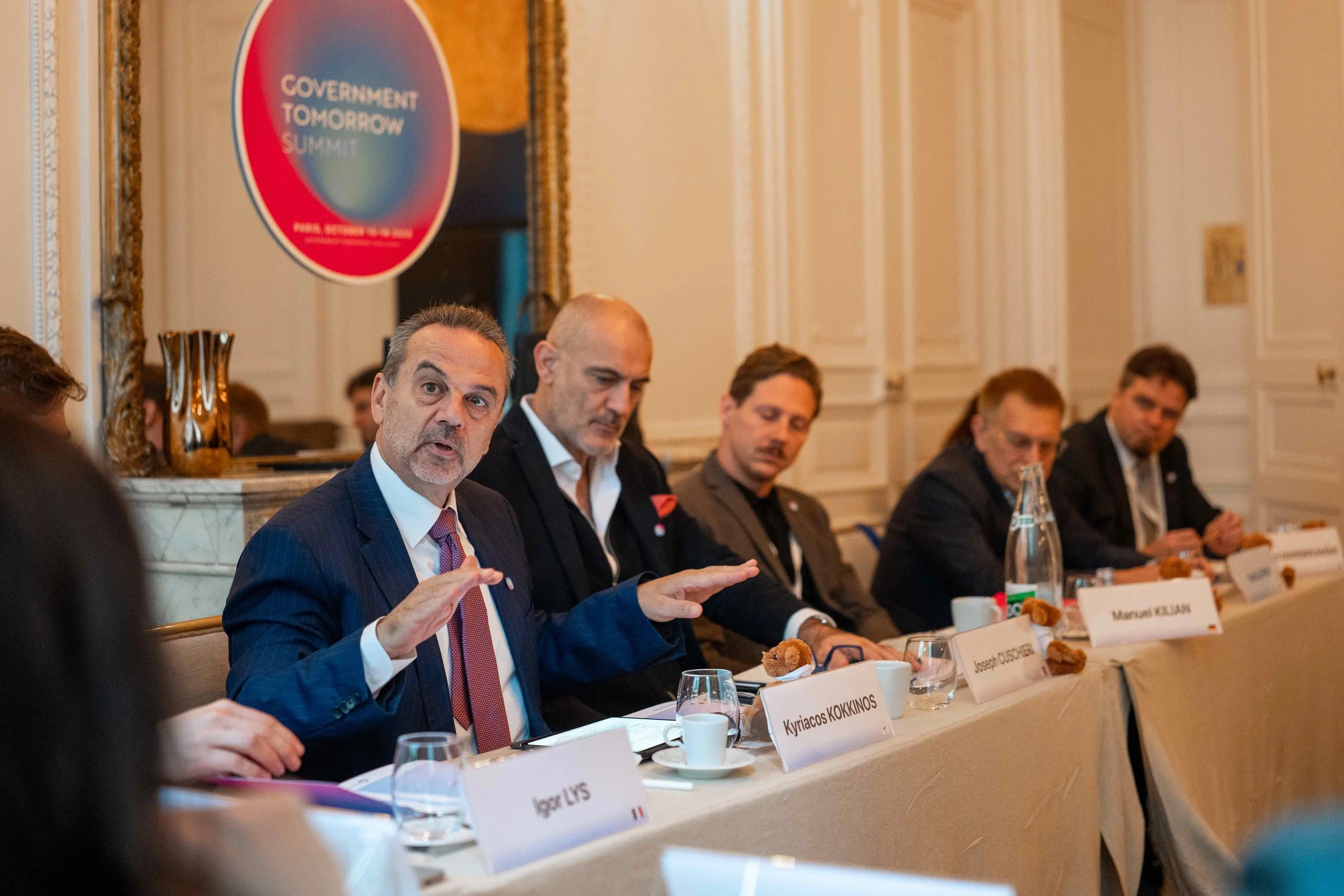Government Tomorrow Summit’s Workshop on Bureaucracy: Building New Expertise
On October 15th, 2025, Government Tomorrow Forum has opened its first Summit in Paris with a workshop focused on tackling bureaucracy. For the first time in Europe, Executive Director of the UAE’s “Zero Bureacracy” program participated in a working session with ministers, business founders, investors, and academics.
The Bureaucracy workshop, the first of two of the Workshop day of the Summit, was presided by Minister Éléonore Caroit of France
At the first closed-door workshop of the Government Tomorrow Summit, global public leaders and innovators came together to confront one of governance’s most persistent challenges: bureaucracy — and the deeper cultural barriers that sustain it. The meeting was presided by Éléonore Caroit, the French Minister delegate for francophony, international partnerships, and French overseas, and moderated by Leonardo Quattrucci, a prominent expert in governance and a professor of innovation in SciencesPo.
The discussion opened with an ambition: to start a discussion that will really change things. The GTF founder Igor Matthieu Lys mentioned the challenge of building events that matter, as compared to those that unite great people but with little outcome. He then introduced the Workshop participants, a combination of minds unique in France, among which some of the leading minds on the continent and beyond —
Hesham Amiri, the Executive Director of the UAE “Zero Bureaucracy” Program
Kyriacos Kokkinos, member of the Governing Board of the European Institute of Innovation and Technology, former Minister of Research, Innovation, and Digital Policy of Cyprus
Mikko Mattinen, Director of the Finnish digital agency
Ledi Imeraj, Director of the Innovation and Excellence agency of Albania
Bob Bennet, Chairman of the Cities Today Institute
Joseph Cuschieri, CEO of Project Green (Malta)
and others
Before the participants there was a serious purpose — to humanize public institutions, bring optimism back into the language of governance, and find ways to transform frustration into creativity.
The workshop’s guiding question was simple yet profound: What would it take to end bureaucracy, not just manage it?
1. Bureaucracy as a Design Flaw — Not a Destiny
Participants agreed that bureaucracy is not an inevitable feature of modern administration, but a “design flaw that can be solved by leadership, design, and technology.”
“If a process doesn’t make people’s lives easier, it has no place in government.”
This philosophy, drawn from successful international experiences, reframes reform as a matter of intentional design — replacing compliance-based logic with impact-based logic. The shift, as one participant explained, is “from process-driven to people-driven government,” measuring success not by procedural completion but by the ease of citizens’ daily lives.
2. Culture as the Hidden Technology of Growth
Referencing recent Nobel-winning research, the moderator reminded the group that “growth comes from culture — culture is a technology.”
Governments, he argued, often lack the self-disruptive instincts that allow organizations to renew themselves. “Innovation in government requires creative destruction,” he noted — yet public institutions rarely reward those who dismantle outdated processes.
This raised a crucial question for participants: How can governments design their own renewal mechanisms — the ability to make parts of themselves redundant before inefficiency does it for them?
3. Simplification and Accountability: The Twin Pillars of Trust
Another strong message came from the reflections on France’s ongoing efforts to simplify its administrative systems. Despite years of reform promises, simplification remains a “marotte,” a recurring political mantra. Yet behind the repetition lies genuine urgency: excessive complexity erodes trust, discourages responsibility, and opens the door to populism.
Participants emphasized that simplification cannot exist without accountability.
“If no one knows who made the decision, then no one can be held responsible for it,” one attendee observed.
Simplification is not merely procedural—it is democratic. It defines who acts, who answers, and who serves.
4. Digital Transformation Is Not Enough
Despite global enthusiasm for e-government, participants cautioned against digital naïveté.
“Just because it’s online doesn’t mean it’s simple,” one participant admitted. “Sometimes we manage to make it even more complicated.”
Digitization, they agreed, can either liberate or entrench bureaucracy — depending on whether the underlying logic is redesigned. “Today bureaucracy is not gone,” another participant warned, “it’s just hiding behind the computer screen.”
5. From Talk to Tools
The workshop closed with a shared commitment to turn ideas into actionable pilots. As one voice put it, “governments don’t compete — what works in one place can work elsewhere.” The task ahead is therefore to document, test, and replicate good ideas, from “zero-bureaucracy” experiments to new accountability frameworks and data-driven service models.
“Many great things began as naive dreams — democracy, human rights, even welfare. So why not the end of bureaucracy?”
The conversation marked the beginning of a larger process.
Through the Government Tomorrow Forum’s upcoming Labs and reports, these ideas will be refined, connected, and turned into real pilot projects — advancing one of the most difficult, yet essential missions of our time: to make government efficient, accountable, and once again worthy of affection.




